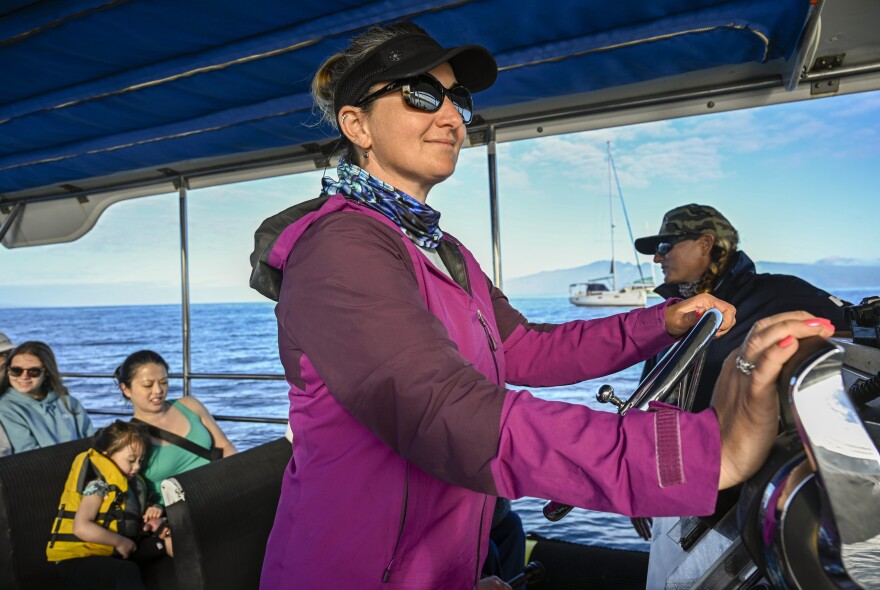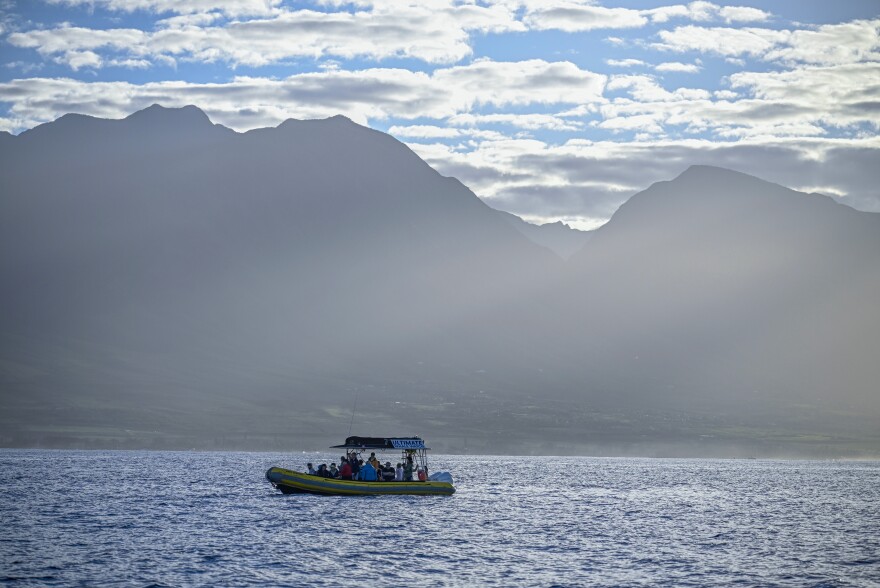LAHAINA, Hawaii – It's a perfect early morning at Kaanapali Beach in West Maui and a dawn voyage on an Ultimate Whale Watch tour is nearly full, with visitors eager to spot humpback whales.
"Alright everybody, good morning! I'm Captain Kristina and we also have Captain Sarah today. Welcome aboard," says Kristina Rau. She jokes that they'll have double the fun with two captains.

It's peak whale watching season, what Rau calls "whale soup" because they're popping up all over the place. As the co-captains review safety protocols, Sarah Hakan includes some new talking points that she's added since the wildfires last August.
"We experienced some great loss personally, so we want to keep the topic on whales today," she says. "We are very grateful to be able to be out here with you guys and have some normalcy back in our lives." She quickly pivots and asks the crowd, "are you excited? Are you ready? I think there is a whale there!"

It was six months ago that deadly wildfires swept through Lahaina, killing 100 people and destroying the historic town, as well as homesin central Maui. In the immediate aftermath of the fires, officials discouraged all non-essential travel to West Maui, where Lahaina is located. And visitor arrivals for the whole island dropped precipitously – in August they were down almost 58% from August the previous year.
The recovery is slowly moving ahead, but tourism – the backbone of the economy for Lahaina as well as Maui – is still struggling to reboot in trying circumstances. West Maui opened to tourists in October and though hazardous debris removal has been underway since, cleanup of the ash just got started three weeks ago.
Lee James, owner of Ultimate Whale Watch in Lahaina, says he's happy to put captains Rau and Hakan and others back to work after being out of business for about four months. He needed time to repair his fleet: four of his five boats were damaged or destroyed in the fires, and he got his first boat back out on the water in December.

"When people come back to work, part of that weight is lifted, and then you get on the water, and it's just energizing, and then you can laugh again," says James. "It's good to see that."
Still, he's only operating two boats now and doing less than half the business he typically did before the fires. He's also employing far fewer people – down from 35 workers to between 16 - 20 depending on bookings.
James says he's trying to take things a day at a time.
"Six months ago you're like, 'are we going to be able to stay on the island?'" he says. And still today, he checks in with his wife every so often, asking her if this is still where she wants to be. "It's such a fluid and dynamic situation," he says. Things feel hard but the couple is committed to staying on Maui.

James' company is one of the more than800 businesses that operated in the disaster area, providing work for about 7,000 people. Local advisors to Maui's mayor estimate about a third of that commerce is back in West Maui at the six-month mark, though the challenges are still profound.
"The stress right now in the community is we just can't go back to the way things were," says Sne Patel, president of the LahainaTown Action Committee. He also serves on Maui's Recovery Commission.
"People not only lost their businesses that day, but also many of them lost their homes," he says. "Their employees lost their homes as well."
Patel says commercial rents are going up because of the shortage of space, and some business owners can't afford to stay in West Maui. Many are relocating elsewhere on the island. With the trauma of the wildfires so fresh, and a lack of long-term housing in Lahaina, the workforce is unstable, he says.
"They're perhaps not even ready to go back [to work], considering they could have lost family," says Patel. Many people, he says, are struggling with their mental health. "There's so many issues that arise from an event like this," he says.

Childcare and schools were disrupted, as multi-generational households have been spread out all over the island, leading to long commutes hampered by the added traffic of trucks removing debris from the burn zone.
Patel is worried about the future. In addition to his other roles, he's also the sales director at a resort rental company and anticipates a 30-40% drop in visitors to the Lahaina area as long as the region is rebuilding, which local officials say could take five years. Patel based his estimate on hotel and rental bookings through this summer.
"It's really that economic tsunami that's yet to really come."
Because of the density of resorts and vacation rentals on this part of the island, he says as goes Lahaina, so goes Maui. For 2023, the number of visitors to the whole island was down 15% from the previous year, according to Hawaii's Department of Business, Economic Development and Tourism.
"You can't divorce the economic impact of the disaster in Lahaina and the impact on the whole island," says Patel.
The Maui Economic Development Board says about70% of every dollar generated on Maui comes from tourism.
Patel says Maui is not in a position to walk away from the tourism-based economy, but more could be done to strike a balance for local workers.
"We give a five-star experience, I feel, to visitors in Hawaii, in Maui especially," Patel says. "The return back to the community, for meeting some of their basic needs, hasn't been five-star."
Locals say that lots of people come to Maui to get a nice experience they can take home, but don't bother to learn about this place in a deep way or invest anything besides tourism dollars.
Patel says the disaster presents an opportunity to change that dynamic.
"Right now is not the time for small changes," he says. "It's the time for big, drastic changes that are going to be shifts for generations to come."
He thinks Maui can be the model for that.

One model that you hear a lot of chatter about is something called "regenerative tourism." Here's how Maui Mayor Richard Bissen explains it to NPR.
"I think the mindset is more of being a guest rather than a tourist," Bissen says. "Let me give you the difference. You folks live in your homes and you have friends that come to your home and they come over as guests and they treat your home a certain way or else you wouldn't let them in your home."
Regenerative tourism would be less extractive and more sustainable, he says, with a focus on the rich culture, history, and environment here. For instance, tourists might volunteer to remove invasive species, reforest the landscape, or restore cultural artifacts.

Mayor Bissen says while discussions continue about Maui's long-term economic strategy, the recovery itself can help fuel the economy in the short-term.
"We're going to have a lot of construction work, just to rebuild what we lost," he says. Bissen's roots are deep on Maui as both of his parents were born here and he spent his formative years on the island.
"I'm not saying that's going to replace tourism. I'm just saying that's the reality: we will be building and rebuilding. And that should obviously bring money into the economy, provide jobs."
The Council for Native Hawaiian Advancement(CNHA) is trying to connect locals to those jobs. CEO Kuhio Lewis walks into a strip mall storefront that his group has converted into a classroom.

"Aloha, aloha," he's greeted by two men and two women who are there getting hazmat certifications.
People who lost their livelihoods to the fires can come here, at no cost, to get certified to work in the cleanup.
That might include getting a commercial truck drivers' license, or completing an occupational safety program required for jobs like clean up and debris removal at the Lahaina burn site.
Lewis says that when the fires hit, his organization sprang into action.

"This is a sense of kuleana," Lewis says, using the Hawaiian word for responsibility. "That's just the familial ties and relationships that we share with each other as a Native people."
He says CNHA has raised more than $20 million in private donations from around the world to support their fire relief efforts.
"The goal here is to provide Maui residents with the tools that they need to be part of their own solution," says Lewis. "Rather than outside mainland corporations or workers coming to take these jobs."
Lewis, who is 40, says stabilizing the economy is key to Maui's future.
And he, too, thinks the long-term solution is embracing regenerative tourism.
"It's about hearing the stories of this place, the history of this place, connecting to the land and the people," Lewis argues. He says that's especially true of a place like Lahaina – which has a rich history as the one-time capital of the Hawaiian Kingdom. "That's the Hawaii that I believe everybody fell in love with. But now it's become like Mai Tais in Waikiki."
Lewis received a state government contract back in May — before the fires — to rethink what tourism could like for all of Hawaii. He's calling that project Kilohana, and its goal is "to overhaul Hawai'i's approach to destination stewardship, visitor management, and marketing to better share our cultural heritage and values in a way that enriches the lives of residents and visitors."
He says that as unfortunate as this disaster has been, it underscored the need to think about these issues. Especially at a time when locals are contemplating whether they'll stay on Maui.
"They're thinking about their quality of life," says Lewis. "They are thinking about their future generations and it's still unclear as to what's going to happen, so you can't blame them if they want to move."
Copyright 2024 NPR. To see more, visit https://www.npr.org.





